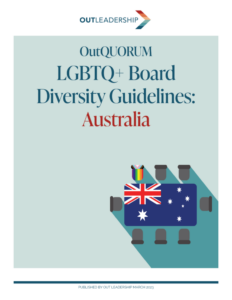
The principles of diversity, equity, and inclusion have been firmly in the spotlight here in Australia over the past few months, as we debated a proposal to constitutionally recognise and establish a representative body for First Nations people – “the Voice”.
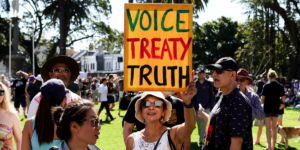
Although significant work and progress has taken place in recent decades towards “Closing the Gap” for First Nations people, there remains much to do before reconciliation between First Nations Peoples and non-Indigenous Australians is achieved.
While the underlying challenges may be different, the desire to overcome societal barriers and discrimination carries a certain sense of familiarity for the LGBTQ+ community. As such, it is hard not to contrast the outcome with the same-sex marriage plebiscite that took place here exactly six years ago. When Australia became the 26th country to legalise same-sex marriage in 2017, it too, was the culmination of decades of hard-fought campaigning by the community and its allies.
Global progress towards equality since then has been mixed. The gap between countries in which sexual and gender diversity is becoming more acceptable and those with increasing repression remains stubbornly wide. Thankfully, Australia and New Zealand continue to be safe jurisdictions for, and advance the rights of and opportunities for, the LGBTQ+ community and same-sex couples.
At Macquarie, we believe the diversity of our people is one of our greatest strengths, enabling us to deliver more innovative and sustainable solutions for our clients, shareholders, and communities. (Pictured below: Rosalind Coffey, Head of People, Culture and Client Experience at Macquarie at the 2022 Out Leadership Australia Summit.)
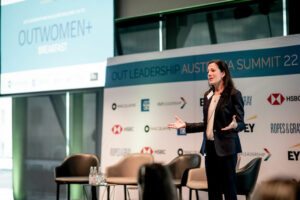
Essential to this is fostering an environment where our people feel respected for their uniqueness, valued for their contributions, and empowered to reach their full potential, and where employees at all levels are confident to bring their full selves to work and their perspectives to the table.
As such, having a diverse workforce and an inclusive workplace goes far beyond fulfilling a requirement for Macquarie; it’s a core element of our human resources and business strategies and is a recognition that representation matters and diversity is a strength that differentiates us amongst our peers.
We have worked hard to ensure a safe and supportive workplace for LGBTQ+ employees for many years, taking both a ‘top-down’ and ‘bottom-up’ approach.
Not only are the principles of equity and inclusion centrally embedded at Macquarie, but our Pride Employee Network Groups (PRIDE ENGs) in each of the regions in which we operate take an active and localised approach to providing strong and active communities for LGBTQ+ employees and their allies.
From the rollout of rainbow flags at reception desks in each of our offices across all jurisdictions to organising regional Pride celebrations, Wear it Purple Days, reverse mentoring, education and awareness events, and community engagement, our PRIDE ENGs work is central to promoting visibility, solidarity, and allyship. I’m delighted that this important work has been recognised by external community partners in countries from the US to the UK, Hong Kong, and Singapore, including nominating Macquarie as a top employer for LGBTQ+ staff.
Macquarie’s commitment extends beyond our own workforce – to working in partnership with organisations such as Out Leadership to accelerate LGBTQ+ progress and celebrate diversity in the corporate environment more broadly. (Pictured below: Shemara Wikramanayake, Macquarie CEO and Todd Sears, Founder & CEO, Out Leadership at the 2022 Out Leadership Australia Summit.)
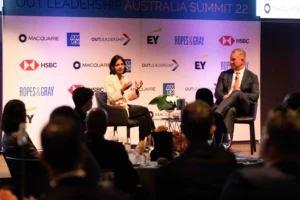
We hosted one of the sessions for Out Leadership’s Australia Summit 2023, where Todd Sears and Macquarie Group General Counsel Evie Bruce had an inspiring discussion covering a range of topics – from the role of leadership in addressing diversity and inclusion issues to how global organisations can ensure consistent support for LGBTQ+ employees in countries with different cultural norms.
I feel immense pride at the work of our two organisations – both together and independently.
And I continue to feel optimistic and proud about the progress Australia has made and is making in the LGBTQ+ space and how we are leading in so many ways. There is still work to do, but we are proof that in a world where progress can sometimes feel slow and where diversity, equity and inclusion do not exist in some countries, Australia can, is, and must lead the way.
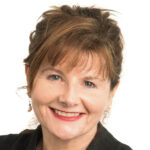
Anne Murphy Cruise
Chair, Macquarie ANZ PRIDE Employee Network Group

Here’s what you need to know this week…
#1
We’re on a mission to make the ASX 200 fully LGBT+-inclusive.
Through our OutQUORUM board diversity initiative, we’re dedicated to making Australian businesses more inclusive than ever before. In 2022, OutQUORUM expanded its mission to measure board diversity in Australia, alongside the United States, the United Kingdom, and Hong Kong.
Founded nine years ago and operating in Australia for the last five, OutQUORUM is the first and only global LGBTQ+ corporate board initiative.
Earlier this year, we celebrated 45 years of Sydney Gay and Lesbian Mardi Gras with a historic gathering of 45 CEOs to advocate for greater LGBTQ+ inclusion in Australia. Our 2022 OutQUORUM report showed that just seven companies on the ASX 200 (3.5%) included LGBTQ+ leaders in their definition of board diversity. We challenged Australian business leaders to expand that number to 100% of companies on the exchange by 2024.
Here’s how you can help.
-
Encourage your company’s board of directors to recognize sexual orientation and gender identity as essential metrics of diversity.
-
Adopt our turnkey board diversity policies to address any gaps in your organization.
-
Share our research on Board Diversity on LinkedIn, Facebook, and Instagram.
#2
October 26th is Intersex Awareness Day.

Pictured above: Members of the Intersex Society of North America marching in Boston, MA
Intersex Awareness Day marks the first public demonstration by intersex people in North America when Morgan Holmes and Max Beck of Intersex Society of North America (ISNA) were joined by allies from Transexual Menace in 1996. The activists marched in front of a conference of the American Academy of Pediatrics in Boston, Massachusetts.
“Intersex” is an umbrella term used to describe people born with sex traits that do not fit binary medical definitions of male or female sexual or reproductive anatomy. Intersex populations are born with these differences in sex traits or may develop them during childhood. An estimated 1.7% of the population is intersex.
Intersex children are often subjected to nonconsensual and medically unnecessary interventions to conform natural variations in their bodies to binary sex stereotypes. These procedures can have serious and long-lasting complications.
Notably, while supporters of laws that ban gender-affirming care in the United States have decried medical treatments for transgender patients as unnecessary surgical interventions on children, many of these bills explicitly carve out an exception to allow sex reassignment of intersex infants to continue. This contradiction suggests that the authors of anti-trans legislation are less interested in the safety and medical best practices for children and are instead interested in upholding traditional standards of a gender binary.
Our Country CEO Briefs, which provide guidance to senior business leaders on LGBTQ+ issues around the world, evaluate whether a nation’s laws prohibit sex reassignment at birth for intersex children.
#3
Meet intersex activist Pidgeon Pagonis.
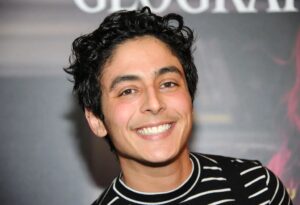
Pictured above: Pidgeon Pagonis
Hailing from Chicago, Pidgeon Pagonis is a compelling voice in intersex advocacy, merging education with evocative storytelling. Their memoir, “Nobody Needs to Know,” narrates a heartfelt self-discovery journey intertwined with staunch advocacy for intersex rights, challenging societal binary norms. In film, Pidgeon birthed “The Son I Never Had,” and co-produced/starred in “A Normal Girl,” illuminating the nuanced intersex narrative.
Currently, Pidgeon is committed to conducting educational talks and workshops, broadening awareness and fostering inclusivity across borders. A new venture gleams on the horizon—a documentary with fresh seed funding, set to spotlight the international intersex movement. It will delve into the resilience and healing journeys of advocates and activists, showcasing how they nurture themselves and their communities amidst their advocacy. Concurrently, Pidgeon is nurturing the foundation of a new intersex organization, aimed at crafting a robust support network. As Intersex Awareness Day looms, Pidgeon’s diverse advocacy projects echo a resonant message: celebrating and honoring human diversity is the pathway to a world where authenticity flourishes.
#4
Hong Kong extends inheritance rights to same sex couples.
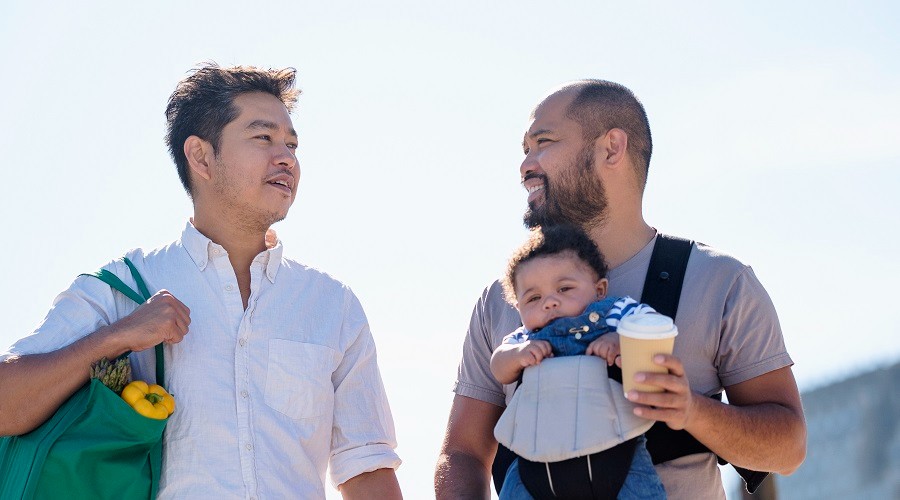
After ruling last week that the government could not discriminate against same-sex couples seeking to rent or own public housing, Hong Kong’s Court of Appeal delivered another victory to LGBTQ+ couples in the Special Administrative Region. The court dismissed an attempt by the government to limit inheritance rights to opposite-sex couples only.
Justice of Appeal Thomas Au called the differential treatment of LGBTQ+ couples “an unacceptably harsh burden” for matters of inheritance. The plaintiffs in the case, Henry Li and Edgar Ng, were married in London in 2017. Shortly thereafter, Ng purchased a subsidized apartment as their matrimonial home. He passed in 2020, leaving Li’s ownership of the property in question.
The Out Leadership Asia Summit in Hong Kong and Tokyo begins next week. Registration is available for select events in the Out Leadership Member Portal.
#5
Nigeria cracks down on LGBTQ+ celebrations.

Paramilitary forces in Africa’s most-populous country arrested 76 attendees at birthday party, which authorities believed was cover for a same-sex wedding. 59 men were arrested, with 21 confessing to being homosexual. 17 women were also reportedly arrested.
Homosexuality is illegal in Nigeria and punishable by 14 years in prison or, in some jurisdictions that practice Sharia law, the death penalty. The death penalty has never been formally applied in Nigeria. Police spokesperson Bright Edafe rebuked calls for acceptance of the LGBTQ+ community:
“We are in Africa and we cannot copy the Western culture because we do not have the same structure and tradition,” she said.
Nigerian authorities have arrested over one hundred men under similar circumstances in the last year, usually on celebrations they allege to be covert weddings. No one arrested following recent raids in the Kano and Delta states have been convicted.
Make sure your team never misses an update.
